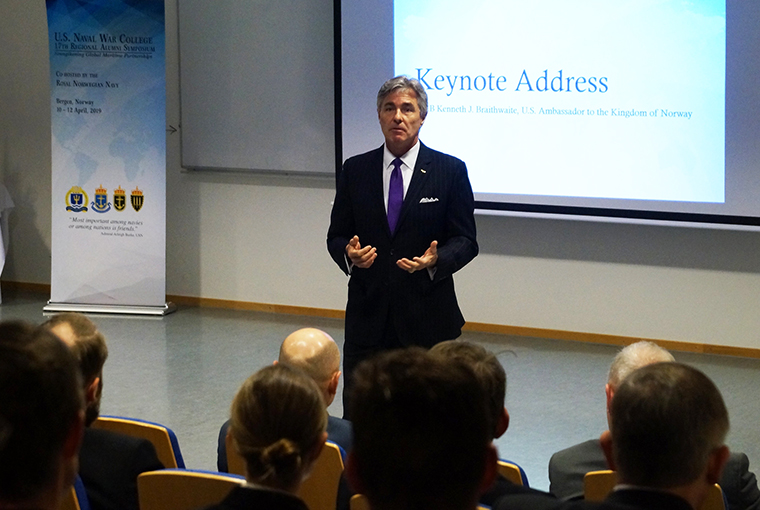U.S. Naval War College Holds 17th Regional Alumni Symposium in Bergen, Norway

U.S. Naval War College (NWC) held its 17th Regional Alumni Symposium (RAS) in Bergen, Norway, April 10-12, 2019. The event was co-sponsored by the Royal Norwegian Navy and explored a wide range of topics under the overarching theme of challenges facing the Arctic and cyber security.
"For many years now, Naval War College alumni have gathered around the world to continue to strengthen our friendship and exchange ideas," said Rear Adm. Jeffrey Harley, president, Naval War College, in his welcome remarks. "Today, now more than ever before countries need to work together to create conditions for peace and stability. We know that new emerging threats come in diverse forms that will challenge each of our countries in so many different ways. This symposium is just one of the ways that we can continue to foster familiarity and trust."
During the three-day event, participants conducted briefings and engaged with panelists on a number of important issues to the region. Some of the topics discussed included the collective defense and security of the Arctic region, the principles of seapower as they relate to capabilities and confidence-building measures, maritime challenges in the eastern and southern flanks of the Baltic, Black and Mediterranean seas and Russia's evolving military strategy.
"It is important to remember that the United States and Norway share an outlook that the Arctic region should be free of conflict, where nations act responsibly," said U.S. Ambassador to Norway Kenneth Braithwaite during the symposium. "The Arctic region is of vital importance to both the United States and Europe, and Norway plays a critical role with respect to the region."
Adm. James G. Foggo III, commander, U.S. Naval Force Europe-Africa and commander, Allied Joint Force Command Naples, Italy further elaborated on the Arctic. "The United States is an Arctic nation and has enduring security interest in the Arctic region. We seek an Arctic region that is stable and free of conflict," he said.
"We operate in the Arctic in line with international laws and norms and welcome other countries to operate in the Arctic as long as that presence is in compliance with international norms and rules of behavior," he continued.
Attendees also participated in an international crisis stability war game. Nina Kollars and Benjamin Schechter, professors, NWC Strategic and Operational Research Department both co-led the war game.
"In this game, players simulated decision-making roles in a national security cabinet given a hypothetical crisis scenario," Kollars said. "Players were divided into teams and generated priority objectives and courses of action to address the crisis. The war game culminates in the development of a whole-of-government response plan."
"The game supports ongoing research on decisions made by leaders during crisis," added Schechter.
"I'd like to thank Adm. Harley and the Naval War College for arranging this regional alumni symposium here at the Naval Academy," said Rear Adm. Nils Andreas Stensones, chief of the Royal Norwegian Navy. "We greatly appreciate your outstanding academic skills, your willingness to share and your willingness to address the 360-degree challenges we face."
Regional Alumni Symposiums like this one are academic conferences designed to continue the professional military education of U.S. Naval War College alumni. Programs include keynote speeches by prominent military leaders and faculty-led panels addressing contemporary challenges.
Photos of the event can be viewed and downloaded at https://www.flickr.com/photos/usnavalwarcollegeri/albums/72157679822290768.
